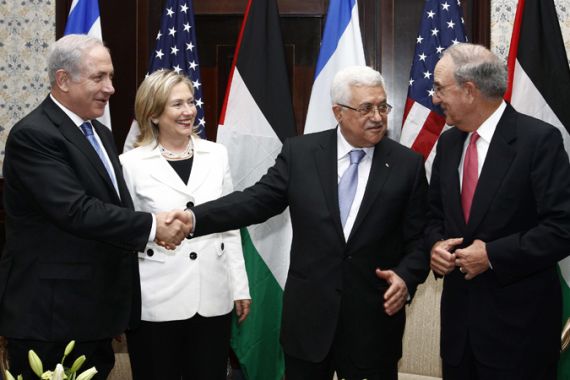Middle East leaders in direct talks
Settlement construction on Palestinian land seen as main hurdle while Netanyahu and Abbas meet in Egyptian resort.

Israeli and Palestinian leaders have met in Egypt for a second round of US-brokered direct negotiations against a backdrop of continued differences over Israel’s plan to build more illegal Jewish settlements on Palestinian land.
No news emerged of any compromise on the settlements issue but Benjamin Netanyahu, the Israeli prime minister, and Mahmoud Abbas, the Palestinian leader, were reported to have held a “serious discussion” on core issues during talks in the Red Sea resort of Sharm el-Sheikh on Tuesday.
Despite the challenges on the core issues – namely, Israel’s security, the borders of a future Palestinian state, the fate of Palestinian refugees and the future of Jerusalem – the US peace envoy still believes a peace deal is possible within a year is possible.
“Today the parties have begun a serious discussion on core issues,” George Mitchell said after Netanyahu and Abbas held around 100 minutes of direct talks.
But Mitchell did not say which of the issues were discussed.
Moratorium urged
Hillary Clinton, the US secretary of state, arrived at Sharm el-Sheikh on Tuesday morning and urged both the Israelis and the Palestinians to find ways to clear the “hurdle” posed by a looming expiration of Jewish settlements.
Earlier, she repeated President Barack Obama’s call for Israel to extend the 10-month moratorium on illegal settlements that is due to expire at the end of this month.
“We believe that the moratorium should be extended,” she said on Monday.
“At the same time we recognise that an agreement that could be forged between the Israelis and the Palestinians on actions that would be taken by both sides that would enable the negotiations to continue is in the best interests of both sides.”
| in depth | |||||||||||||
|
The Palestinians have said that if the moratorium is not extended, the negotiations could come to a complete halt.
The current freeze has not prevented the Israeli government from approving new settlements in East Jerusalem.
“Choosing to continue with settlements in any form means destroying the negotiations,” Saeb Erekat, the chief Palestinian negotiator, said.
Erekat was speaking after Netanyahu said on Sunday that he would not extend a partial building freeze, though he indicated he would curb future construction.
Al Jazeera’s Sherine Tadros, reporting from the Jewish settlement of Har Homa, said: “There are now half a million Jewish settlers across the occupied West Bank and that certainly has made it very difficult for anyone to envision a continuous Palestinian state because of the proximity of the settlements to Palestinian cities.”
Allies of Netanyahu, whose coalition is dominated by pro-settler parties, warn of a government collapse if he fails to resume expanding the illegal settlements in the occupied West Bank.
Al Jazeera’s Ayman Mohyeldin, reporting from Sharm el-Sheikh, said that settlements remain the main issue.
“It does not look promising, but what we could see emerge is some sort of compromise, similar to what happened the last time – the Israelis agreed to stop building new settlements, but continued with what they called ‘natural growth’ of existing illegal settlements,” he said.
‘Immediate obstacles’
On the eve of the Sharm el-Sheikh talks, Philip Crowley, the US state department spokesman, said: We understand that we face some immediate obstacles that we hope to resolve in the next couple of weeks.”
Clinton said Netanyahu had made it clear that Israel faces severe security challenges as the Hezbollah in Lebanon and Hamas in the Gaza Strip acquire more dangerous missiles and rockets.
As for Abbas, she said he has long called for a two-state solution but must prove to the Palestinian people he can achieve the goal through negotiations rather than armed resistance.
When Clinton brokered the launch of the direct negotiations on September 3 in Washington, both sides agreed that within a year, they will resolve the core issues of Israeli security, borders of a Palestinian state, the fate of Palestinian refugees and the status of Jerusalem.
The Palestinians want a state in the West Bank and Gaza, with East Jerusalem as its capital. Netanyahu has embraced a two-state solution, but has shown no sign on yielding on Jerusalem as the undivided capital of the Jewish state.
